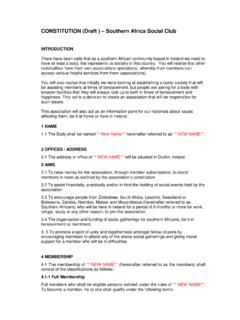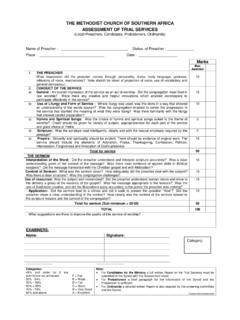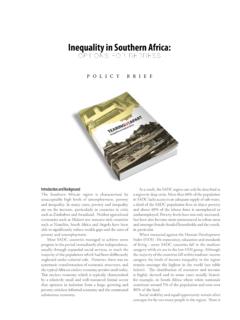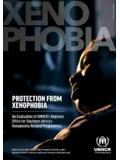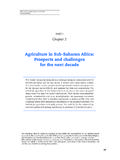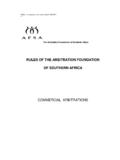Transcription of Stipends within the Methodist Church of Southern Africa A ...
1 Disclaimer: Please note that this paper does not represent the views of the Methodist Church of Southern Africa or DEWCOM, unless specified otherwise. Status: Discussion document URL: Stipends within the Methodist Church of Southern Africa A Response from the Doctrine Ethics and Worship Committee 2 2 THE Methodist Church OF Southern Africa SUMMARY STATEMENT OF THIS DOCUMENT This DEWCOM document is in response to the conference resolution of 2003 (refer to Appendix A) and the subsequent discussion document for Ministers and Members of The Methodist Church of Southern Africa (MCSA)
2 Regarding Minister s Stipends that was produced by the General Treasurers and MCO Executive July 2004. This document affirms: That the stipend debate is about Connexional holiness before it is about finance. That the present stipend system should change to favour justice and mission. That non-payment of ministers should never be tolerated. That parity / equality does not mean sameness . That scripture calls us to embody the values of both freedom and fairness in our economic systems.
3 That we share Connexionally in proportion to our relative wealth for the common good of all. That the MCSA should work towards application of a system similar to the old augmentation fund. That gifts be permitted on condition that all monies are declared through the MCO. That any new system will only work if it is based upon trust, truth and transparency. That any new system would need to be phased in over time. That any new system needs to be sensitive to our African context of enormous economic disparities.
4 That our stipend system be constantly critiqued in the light of Jesus teaching and example. INTRODUCTION It is extremely difficult for many of us to speak openly and honestly about money. What we earn is often our best kept secret, assisted of course by the fact that many of us from a young age were taught that it is extremely impolite to ever ask someone about their personal financial matters. Financial matters are deemed to be private. Yet, there are few other areas of our private lives that are as publicly influential.
5 This hesitancy to speak openly about money seems equally prevalent among Christians as it does amongst any other group of people. This may not surprise us, but it is a sad indictment on at least three accounts. First, it perpetuates the false belief that faith and finance have nothing to say to each other as if they were meant to live in blissful independence of each other. In this regard, please refer to appendix (B) 1 for a helpful article concerning the connection between money and Christian spirituality.
6 Once we have made the connection between money and our friendship with Jesus, we discover that our discussion around Stipends is not so much a discussion about money as it is about holiness. Second, it differs remarkably from the example of Jesus, who it seemed, couldn t speak enough about money-matters. In fact, outside of Jesus teaching on the Kingdom of God, he spoke more about money-matters than any other topic. In the New Testament, one out of every sixteen verses is about the poor [and related money-matters].
7 In the Gospels, the number is one out of every ten verses; in Luke s Gospel one of every seven, and in the book of James one of every five. 2 No wonder Jesuit theologian John 1 Vicki Curtiss, Connecting Money and Spirituality, (in Ministry and Money Handbook, by Jan Sullivan Dockter, 2001), 15. 2 Jim Wallis, The Soul of Politics, (Orbis, 1994), 149. 3 3 Haughey, laments that, we read the Gospel as if we had no money, and we spend our money as if we know nothing of the Gospel.
8 3 Third, it betrays the authenticity of our Connexional community. To view money as a purely private matter is to deny the truth that we are all family. It thereby opposes Jesus prayer that we may all be one .4 We need to be reminded that there is no such thing as a solitary Christian. Further, not only do we find it difficult to talk about money, but when we do, it is painfully obvious how our own self-interest is able to dominate the discussion. Seemingly, we have an incredible compulsion to legitimise our own financial advantages.
9 To protect us from this so that we may live no longer for ourselves ,5 we need to be deliberate in having this faith and finance discussion with people on all sides of the economic spectrum. With this in mind, we suggest that this document not only be read by individuals, but be discussed in forums that will include as many diverse economic perspectives and interests as possible within the Methodist Connexion. CHANGE AS CONVICTION, CONVERSION AND CONTRITION IN OUR CONTEXT Using the language of our faith, change involves at least three processes: 1.
10 Conviction is the realisation that the way things are is not the way things should be. It involves the growing discontent with the status quo. 2. Conversion is the realisation of what should be. It involves the awakening to God s Kingdom vision. 3. Contrition is repentance. It involves turning around from what is to what should be. It is a journey toward holiness and justice. Holiness and justice are always grounded in a specific context. Importantly, if these three processes are to have integrity, they need to honour the specific social context in which they find themselves.


